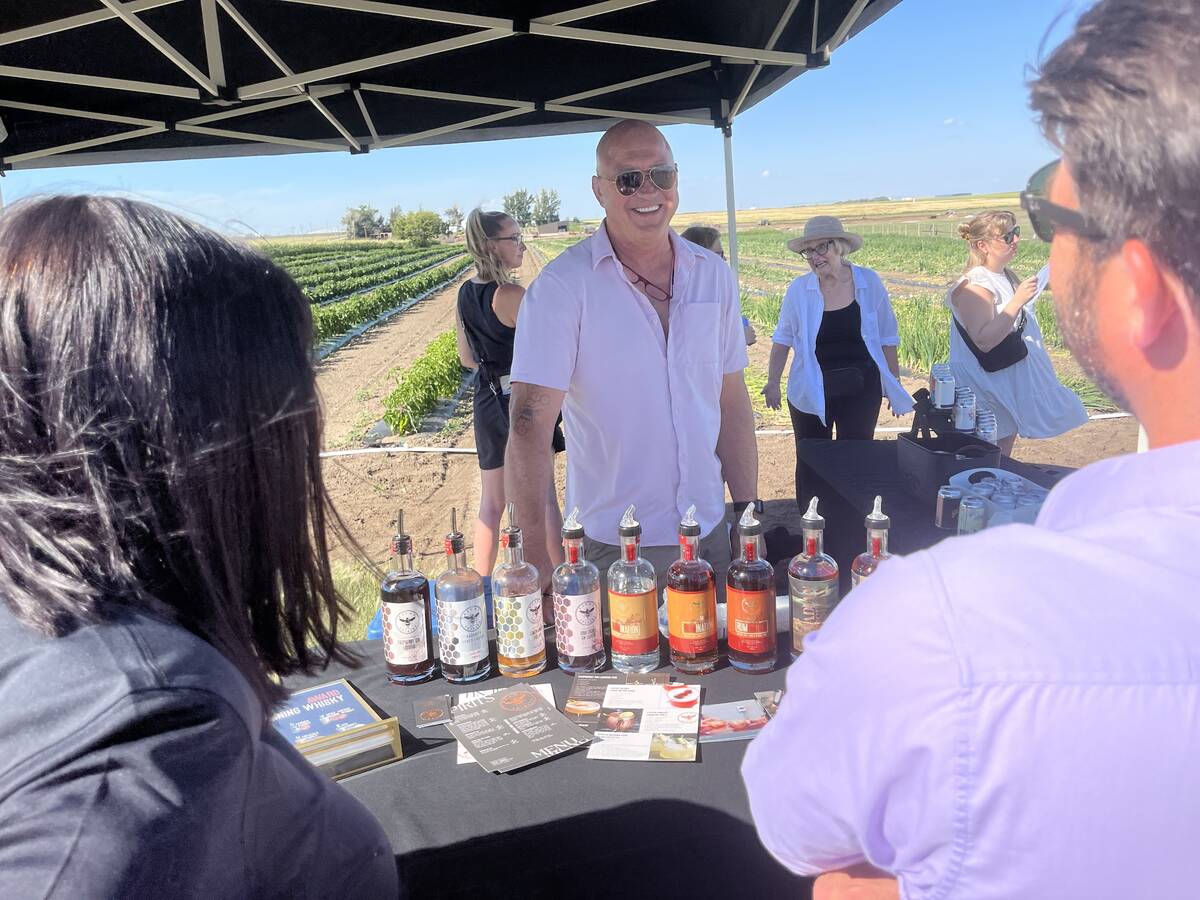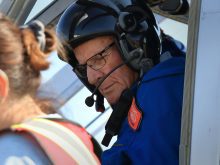AIRDRIE, Alta. – Farming and technology are among Gordon Bussey’s favourite subjects.
A pedigreed seed grower, retailer and innovator, Bussey considers himself a self-taught engineer who is always ready for new ways to add value and improve his farm north of Airdrie.
He was an early adopter of GPS technology starting with yield and field mapping programs in his combines 10 years ago. Last year he added auto steering and parallel tracking for seeding, spraying and combining. Records from the field are entered into a Palm Pilot while he is on the go.
Read Also

From farmer to award-winning distiller
Pivot Spirits showcases transition from farmer to distiller with provincial award-winning results in Alberta for Lars Hirch
Even his wife, Joanne, likes the innovations.
“Our combine steers itself so I can sit with him in the combine and visit because he is not constantly steering and looking at the ground,” she said.
With help from his son, Jeff, he built a 60-foot wide implement on a cultivator frame with discs every 12 inches. These cut into the soil and are followed with mid row banders set close to the discs to drop in seed and pack it.
“We’ve seeded 18,000 acres with it and it hasn’t winked or blinked,” he said.
Hay is part of the rotation program. When the Busseys are ready to change the crop, this seeder allows them to slice directly into the sod, a good fit with their no-till conservation policy.
They do all their own maintenance and construction on the farm. Bussey has his air conditioning and welder’s certificates and is an experienced machinist.
Outside of a three year hiatus in the oil business, he has farmed all his life.
“I made a lot of money and decided I should spend it in land,” he said.
He bought his first parcel in 1966 and continued to increase the farm to its present 5,000 acres.
His father started the pedigreed seed business in 1943 and Bussey became a registered grower in 1970.
This farm runs every day of the year producing, processing and selling seed they grew or obtained from other growers to meet customer demands for a wide variety of crops.
It takes long range planning and forecasting.
“You have to look two years ahead and see what you think the market will want,” he said.
Some years the Busseys meet customer demand precisely, but other years they have missed the mark and have to get rid of the inventory.
A large part of the business is working with major feedlots in the area. Sales include a specially developed silage blend that yields high tonnage and protein levels. They also sell them seed for forage oat and pea crops.
To use up some of their own grain and screenings, the Busseys run a 1,000 head feedlot. Another feedlot buys fines and screenings to blend with silage for cow rations.
“We have a good feedlot clientele so we are looking after them by moving forward with things that will work for their silage productions. Feedlots tend to be large enough so they weather storms when markets are down,” he said.
An evolving business is providing clients with practical advice and suggestions on new varieties, fertilizer and herbicide use.
“I do more production conversations than I ever have in the past. I always qualify it with, ‘I’m not an expert on your farm.’
“Everybody is looking for somebody to sort that out for them and that is part of the reason people are asking for more questions. People want to make the right decision so they are gathering more information from every source,” he said.
As a registered seed business, the farm is under a quality assurance program audited annually by the Canadian Seeds Institute. It checks for documentation, seed integrity, varietal purity and fusarium controls.
Life is changing in other ways.
While registered seed production acres are up, there are fewer growers in the province.
There are also fewer neighbours but more acreage developments and pressure from energy companies.
So far, they have been able to keep wells off their land by arguing they are a biosecure unit and fear the introduction of weeds or even fusarium. Bussey is less concerned about acreage owners who have become customers looking for grass seed.
Yet he and Joanne worry about this cycle of farming where costs are increasing but not the profits.
On the retail side of the business they see more cash-poor customers and they have done some bartering for grain.
Farming has been difficult in recent years but there is no shortage of work.
“I was brought up to believe the harder you work, the better you do,” said Joanne. She was a former teacher and grew up in nearby Crossfield. She has no regrets about coming to the farm.
“I was lucky to fall in love with a farmer,” she said.
Part of their faith in the future is ongoing involvement with the outstanding young farmers program.
In 1982 they won the outstanding young farmers’ award for Canada. As active alumni, they find the other nominees invigorating company because optimism runs high and many are technologically innovative like themselves.
As hard as they both work, there is time for volunteer activities.
Bussey is a past-president of the Alberta Seed Growers’ Association and chaired the provincial soil conservation advisory board, a body responsible for many of today’s conservation programs.
He worked with the local rural crime watch group and actively supports 4-H and rural electrification associations.
He was a director of the Olds College Foundation and has been a director of the Calgary Stampede board for the last seven years.
His work with the Stampede is one of the busiest jobs and most rewarding.
He started as a volunteer 25 years ago and was eventually elected to the 29 member board where he is directly involved in the $200 million renovations designed to maintain the focus on farm roots.















